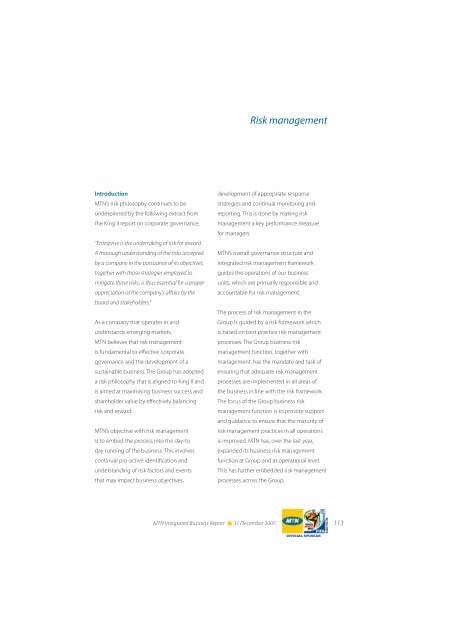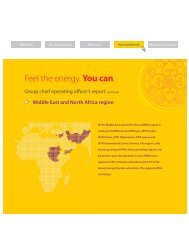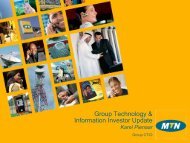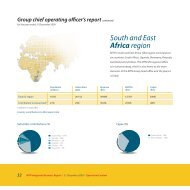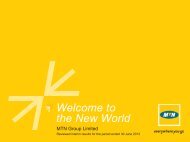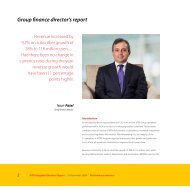Risk management - MTN Group
Risk management - MTN Group
Risk management - MTN Group
Create successful ePaper yourself
Turn your PDF publications into a flip-book with our unique Google optimized e-Paper software.
<strong>Risk</strong> <strong>management</strong><br />
Introduction<br />
<strong>MTN</strong>’s risk philosophy continues to be<br />
underpinned by the following extract from<br />
the King II report on corporate governance.<br />
“Enterprise is the undertaking of risk for reward.<br />
A thorough understanding of the risks accepted<br />
by a company in the pursuance of its objectives,<br />
together with those strategies employed to<br />
mitigate those risks, is thus essential for a proper<br />
appreciation of the company’s affairs by the<br />
board and stakeholders.”<br />
As a company that operates in and<br />
understands emerging markets,<br />
<strong>MTN</strong> believes that risk <strong>management</strong><br />
is fundamental to effective corporate<br />
governance and the development of a<br />
sustainable business. The <strong>Group</strong> has adopted<br />
a risk philosophy that is aligned to King II and<br />
is aimed at maximising business success and<br />
shareholder value by effectively balancing<br />
risk and reward.<br />
<strong>MTN</strong>’s objective with risk <strong>management</strong><br />
is to embed the process into the day-to<br />
day running of the business. This involves<br />
continual pro-active identification and<br />
understanding of risk factors and events<br />
that may impact business objectives,<br />
development of appropriate response<br />
strategies and continual monitoring and<br />
reporting. This is done by making risk<br />
<strong>management</strong> a key performance measure<br />
for managers.<br />
<strong>MTN</strong>’s overall governance structure and<br />
integrated risk <strong>management</strong> framework<br />
guides the operations of our business<br />
units, which are primarily responsible and<br />
accountable for risk <strong>management</strong>.<br />
The process of risk <strong>management</strong> in the<br />
<strong>Group</strong> is guided by a risk framework which<br />
is based on best practice risk <strong>management</strong><br />
processes. The <strong>Group</strong> business risk<br />
<strong>management</strong> function, together with<br />
<strong>management</strong>, has the mandate and task of<br />
ensuring that adequate risk <strong>management</strong><br />
processes are implemented in all areas of<br />
the business in line with the risk framework.<br />
The focus of the <strong>Group</strong> business risk<br />
<strong>management</strong> function is to provide support<br />
and guidance to ensure that the maturity of<br />
risk <strong>management</strong> practices in all operations<br />
is improved. <strong>MTN</strong> has, over the last year,<br />
expanded its business risk <strong>management</strong><br />
function at <strong>Group</strong> and at operational level.<br />
This has further embedded risk <strong>management</strong><br />
processes across the <strong>Group</strong>.<br />
<strong>MTN</strong> Integrated Business Report 31 December 2007 113
<strong>Risk</strong> <strong>management</strong> continued<br />
Governance roles and responsibilities for<br />
risk <strong>management</strong> are clearly defined. In<br />
summary, these are:<br />
<strong>Group</strong> board: The board has ultimate<br />
responsibility for risk <strong>management</strong>. It<br />
considers risk reports from the <strong>Group</strong> risk<br />
<strong>management</strong> and compliance committee<br />
and input from the <strong>Group</strong> audit<br />
committee in assessing the effectiveness<br />
of <strong>MTN</strong>’s risk <strong>management</strong>.<br />
<strong>Group</strong> risk <strong>management</strong> and compliance<br />
committee: This sub-committee of<br />
the board is the oversight body for risk<br />
<strong>management</strong>. It sets and approves the<br />
<strong>Group</strong> risk <strong>management</strong> framework and<br />
reviews the overall effectiveness of risk<br />
<strong>management</strong> structures and practices.<br />
It reviews the <strong>Group</strong> risk profile and<br />
<strong>management</strong>’s reports on the mitigation<br />
of key risks, and oversees reporting on risk<br />
matters to stakeholders. This committee<br />
meets regularly. At the various country<br />
operations, this oversight is performed by<br />
operational audit and risk committees.<br />
<strong>Group</strong> risk executive: The <strong>Group</strong> risk<br />
executive is not responsible for managing<br />
risk – this is a <strong>management</strong> responsibility –<br />
but is responsible for ensuring an effective<br />
framework for risk <strong>management</strong> and for<br />
driving its implementation throughout<br />
the <strong>Group</strong>. This is done by assisting and<br />
educating <strong>management</strong> on the topic. The<br />
<strong>Group</strong> risk executive also assists with the<br />
effective reporting and escalation of risks.<br />
Operational audit and risk committees:<br />
These are the oversight bodies for<br />
each country operation and are<br />
sub-committees of their boards. In all<br />
countries, the audit and risk committee<br />
also fulfils the role of risk committee with a<br />
separate agenda for risk <strong>management</strong>.<br />
The chief executive and <strong>management</strong> of<br />
each operation take ownership for day-today<br />
<strong>management</strong> of the operation and its<br />
risks, supported by the local risk manager<br />
or head of internal audit. CEOs report the<br />
risk profile of their operations regularly to<br />
<strong>Group</strong> <strong>management</strong> as well as to the risk<br />
and audit committee of their operation.<br />
114<br />
<strong>MTN</strong> Integrated Business Report 31 December 2007
These roles and responsibilities are diagrammatically summarised as follows:<br />
<strong>Group</strong> board<br />
<strong>Group</strong> risk and compliance<br />
committee<br />
<strong>Group</strong> business risk<br />
executive<br />
<strong>Group</strong> executive<br />
committee<br />
Operational<br />
board<br />
Vice<br />
presidents<br />
Business risk<br />
<strong>management</strong><br />
department<br />
Operational audit<br />
and risk committees<br />
Operational CEOs<br />
Operational business risk<br />
<strong>management</strong> unit<br />
<strong>MTN</strong> Integrated Business Report 31 December 2007 115
<strong>Risk</strong> <strong>management</strong> continued<br />
<strong>Risk</strong> <strong>management</strong> process<br />
The risk <strong>management</strong> process broadly<br />
consists of the following iterative phases:<br />
<strong>Risk</strong> identification – <strong>Risk</strong>s are continually<br />
identified through focused discussions,<br />
workshops and scenario analyses.<br />
<strong>Risk</strong> evaluation – <strong>Risk</strong>s are evaluated for<br />
their potential impact on the organisation,<br />
probability of occurrence and classified<br />
according to the nature of the risk.<br />
Response strategies – Response strategies<br />
depend on the nature of the risk and may<br />
often combine various actions, including<br />
insurance, outsourcing, risk avoidance or<br />
active risk <strong>management</strong> through people,<br />
processes and systems. The cost of risk<br />
mitigation is considered in determining<br />
response strategies. Certain risks are<br />
accepted based on their impact on the<br />
organisation and the <strong>Group</strong>’s risk appetite.<br />
<strong>Risk</strong>s such as political, economic, currency<br />
and regulatory are largely beyond<br />
<strong>MTN</strong>’s control and mitigation is limited to<br />
responsive actions to counter their impact.<br />
This could include continual monitoring,<br />
compliance, insurance, diversification,<br />
hedging or acceptance of the risk.<br />
Monitoring and reporting – <strong>Risk</strong>s<br />
are reported to the right levels of<br />
<strong>management</strong> and response strategies are<br />
continually monitored for progress and<br />
changes.<br />
During 2007, risk assessments were<br />
conducted at all 21 <strong>MTN</strong> operations and<br />
mitigating action plans produced. All<br />
operations currently report the status of their<br />
risks at least quarterly.<br />
<strong>MTN</strong>’s risk landscape<br />
<strong>MTN</strong>’s risk landscape largely consists of the<br />
following main categories of risk:<br />
Operating environment risk<br />
Regulatory risk<br />
Marketing and pricing risk<br />
Technology risk<br />
Human resources risk<br />
Financial risk<br />
Investment risk<br />
Physical interruption risk<br />
Governance risk<br />
Reputational risk<br />
Relationship and partnership risk.<br />
116<br />
<strong>MTN</strong> Integrated Business Report 31 December 2007
Changes in <strong>MTN</strong>’s risk landscape over the<br />
last year as well as progress made on the<br />
mitigation of risks were as follows:<br />
Operating environment risk<br />
The possibility of changes in the stability of<br />
countries in which <strong>MTN</strong> operates and the<br />
impact on profits and strategic objectives<br />
is an inherent risk to a company such as<br />
<strong>MTN</strong> which operates in varied markets. This<br />
is a key consideration in <strong>MTN</strong>’s expansion<br />
strategy as far as risk and reward is concerned<br />
and, as a result, active mitigation of this risk<br />
is a priority. During the last year, challenges<br />
were experienced in countries such as<br />
Benin, Guinea Conakry and Afghanistan.<br />
In Benin, <strong>MTN</strong> went through a challenging<br />
period due to changes in licence conditions.<br />
This has, however, been resolved and the<br />
Benin operation is fully functional again.<br />
In Guinea Conakry, political unrest resulted<br />
in temporary instability in the country. This,<br />
however, did not have a material impact on<br />
the performance of <strong>MTN</strong>’s operation in this<br />
country. In Afghanistan, continued political<br />
instability has made operating conditions<br />
challenging. <strong>MTN</strong> and other mobile<br />
operators have suffered minor losses as a<br />
result of political violence. There has been<br />
significant focus on managing risk during the<br />
past year and control measures to mitigate<br />
against potential negative outcomes have<br />
been strengthened. These measures include:<br />
Ongoing focus on corporate citizenship<br />
and social responsibility programmes in<br />
each country<br />
The appointment of a <strong>Group</strong> crisis<br />
manager and development and<br />
implementation of a crisis <strong>management</strong><br />
and monitoring process<br />
Physical and staff security measures<br />
Travel risk <strong>management</strong><br />
Continual monitoring of the political<br />
environment in operating countries<br />
Ring-fencing operations to limit systemic<br />
risk from possible failure in operations<br />
Appropriate risk transfer structures and<br />
strategies.<br />
Regulatory risk<br />
Regulatory bodies in a number of<br />
<strong>MTN</strong>’s operating countries are not fully<br />
matured, exposing <strong>MTN</strong> to risk in this area.<br />
The response strategies implemented to<br />
manage this risk include:<br />
Strict compliance with existing regulations<br />
Legal and regulatory compliance functions<br />
in each country<br />
<strong>MTN</strong> Integrated Business Report 31 December 2007 117
<strong>Risk</strong> <strong>management</strong> continued<br />
Active participation in establishing<br />
regulatory frameworks<br />
Active participation in regulation and<br />
rule-making procedures<br />
Policy-lobbying actions at legislative,<br />
executive and ministerial level where<br />
appropriate<br />
Relationship <strong>management</strong> with<br />
governments and regulators<br />
Ongoing focus on corporate citizenship<br />
and social responsibility programmes in<br />
each country.<br />
Marketing and pricing risk<br />
<strong>MTN</strong>’s expansion into various African and<br />
Middle Eastern markets has reduced its<br />
dependence on certain markets. Adverse<br />
changes in these markets will now have less<br />
of an impact on the <strong>Group</strong>. However, overall<br />
dependence on the South African and<br />
Nigerian markets is still significant.<br />
Large multinational players are increasingly<br />
entering markets in which <strong>MTN</strong> operates.<br />
This, in turn, demands that <strong>MTN</strong> adapts its<br />
marketing strategy and tests its products and<br />
services to remain competitive and satisfy<br />
customer demand. Furthermore the use of<br />
local suppliers and skills in combination with<br />
global suppliers ensures that local market<br />
needs are understood and addressed. Pricing<br />
risk in certain markets remains an area of<br />
focus in the <strong>Group</strong>. This is mitigated by<br />
targeted segment-driven value propositions<br />
to manage and control churn and build<br />
customer loyalty.<br />
Technology risk<br />
Technology risk in <strong>MTN</strong> is viewed from an<br />
internal and external perspective. The internal<br />
perspective refers to the availability, scalability,<br />
quality and efficiency of <strong>MTN</strong>’s networks and<br />
information system. The external perspective<br />
refers to the risk and/or opportunity from<br />
changes in the technology world.<br />
From an internal perspective, rapid growth<br />
in demand in certain countries like Nigeria<br />
and Ghana, for example, has resulted in<br />
network capacity constraints and <strong>MTN</strong><br />
had to fast track its network roll-out<br />
programme. <strong>MTN</strong> will continue its significant<br />
network capitalisation programme in<br />
2008. <strong>MTN</strong> has also made significant<br />
progress in improving the maturity of<br />
its information systems and business<br />
processes, surrounding these with the roll<br />
out of <strong>Group</strong>-wide standardisation projects.<br />
118<br />
<strong>MTN</strong> Integrated Business Report 31 December 2007
Standardisation of processes directed by<br />
industry best practice, eg eTOM and ITIL,<br />
ensures common business experiences<br />
across the <strong>Group</strong> and reduces operational<br />
risk. During 2008 business processes and<br />
common technical functionality in all<br />
operations will be standardised in the billing,<br />
revenue assurance and fraud areas. The<br />
implementation of regional <strong>management</strong><br />
and support structures will further assist with<br />
this process.<br />
From the external perspective, technology<br />
developments that could raise<br />
<strong>MTN</strong>’s technology risk profile include<br />
technologies like WiMax, 3G Evolution<br />
and LTE as well as the next generation<br />
of converged services and network<br />
infrastructure. <strong>MTN</strong> has moved from the<br />
research and development stage on<br />
WiMax to fully operational phase in certain<br />
operations, thus enabling <strong>MTN</strong> to compete<br />
in this space. The next generation of<br />
converged services and NGN infrastructure<br />
include technologies such as voice-over<br />
internet protocol (VoIP), instant messaging<br />
and other IP technologies and mobile<br />
internet/telco2.0 services that are entering<br />
and converging with the fixed, mobile,<br />
internet and media space. <strong>MTN</strong> has made<br />
good progress in competing in this area<br />
with the diversification of revenue streams<br />
by establishing internet service<br />
providers in a number of<br />
existing operations. Additionally,<br />
<strong>MTN</strong> has made good progress<br />
in providing innovative solutions<br />
leveraging the benefits of<br />
convergence to its consumers.<br />
This has been realised by providing<br />
increased internet access through<br />
mobile networks and the<br />
launch of social<br />
network<br />
solutions<br />
such as<br />
NokNok<br />
in South<br />
Africa. <strong>MTN</strong><br />
constantly<br />
monitors the<br />
maturity of these<br />
technologies<br />
and market<br />
requirements<br />
to ensure that it<br />
competes with these<br />
technologies at the<br />
right time.<br />
<strong>MTN</strong>’s objective with<br />
risk <strong>management</strong><br />
is to embed the<br />
process into the<br />
day-to day running<br />
of the business.<br />
<strong>MTN</strong> Integrated Business Report 31 December 2007 119
<strong>Risk</strong> <strong>management</strong> continued<br />
Human resource risk<br />
<strong>MTN</strong>’s expansion and evolvement into a truly<br />
international company has brought more<br />
skills into the <strong>Group</strong> and increased its ability<br />
to attract the right skills. It has also given<br />
<strong>MTN</strong> more flexibility in the deployment of<br />
its staff. However, the limited availability of<br />
skills in the telecommunications industry is<br />
an ongoing challenge from a staff attraction<br />
and retention point of view. We know that<br />
the key to our success lies in our people.<br />
A number of initiatives are in place to<br />
address this challenge, one of which is the<br />
creation of a talent <strong>management</strong> board<br />
which is a sub-committee of the <strong>Group</strong><br />
executive committee. The objective of this<br />
board is to focus on the development and<br />
retention of talent across the <strong>Group</strong>. Other<br />
initiatives include leadership development<br />
programmes, performance <strong>management</strong><br />
programmes and succession planning.<br />
<strong>MTN</strong> plans to introduce a corporate<br />
learning centre to focus on building skills<br />
in <strong>MTN</strong> in 2008. The integration of the<br />
<strong>MTN</strong> and Investcom groups from a cultural,<br />
ethical and values perspective as reported<br />
previously has progressed well.<br />
Financial risk<br />
Repatriation of earnings<br />
<strong>MTN</strong> continued to successfully repatriate<br />
earnings in the form of dividends, loan<br />
repayments and/or <strong>management</strong> fees from<br />
the majority of its operations. Remittances<br />
from Syria have been negatively affected<br />
by the slow pace of implementation of<br />
legislation, creating uncertainty following<br />
the liberalisation of financial markets.<br />
No dividends have been declared in the<br />
Ghanaian operation (due to an unresolved<br />
shareholder dispute). Part of treasury<br />
<strong>management</strong> activities is to manage<br />
conversion from local currency to ensure<br />
effective pricing and limit liquidity risk. The<br />
availability of foreign currency as well as the<br />
impact of sanctions do, however, remain risks<br />
to the <strong>Group</strong>. This is closely monitored.<br />
Currency<br />
The <strong>Group</strong> operates internationally and is<br />
exposed to foreign exchange risk. Currency<br />
exposures are diverse and complex. Some<br />
of these exposures are due to translation of<br />
local currency reporting to South African<br />
rand. Currency risks that are more tightly<br />
120<br />
<strong>MTN</strong> Integrated Business Report 31 December 2007
managed are those relating to the mismatch<br />
of operational or capital expenses and/or<br />
asset and liabilities to revenues streams. We<br />
match these as much as possible by securing<br />
contracts in local currencies to ensure natural<br />
hedges. Where this is not possible, we hedge<br />
through derivatives, if these are available in<br />
the markets. <strong>MTN</strong> does not hedge translation<br />
risk nor does it take speculative positions<br />
in currencies. A foreign exchange policy<br />
contained in the treasury policy regulates the<br />
<strong>management</strong> of these risks.<br />
Credit risk<br />
The risk of bad debts from <strong>MTN</strong>’s subscribers<br />
has always been low because <strong>MTN</strong> has a<br />
predominantly prepaid client base.<br />
The risk of bad debts from key distributors is<br />
equally low as a result of the stringent credit<br />
policy and payment terms.<br />
The recoverability of interconnect debt from<br />
other operators in certain of <strong>MTN</strong>’s operating<br />
countries remains a risk to the <strong>Group</strong> and is<br />
problematic in certain operations. The expansion<br />
of the <strong>Group</strong> has reduced the overall impact<br />
of this as a result of reduced dependency on<br />
certain markets relating to this risk.<br />
Tax<br />
<strong>MTN</strong>’s exposure to changes in tax legislation<br />
and its resultant impact remains a risk.<br />
The <strong>Group</strong> operates in jurisdictions where<br />
the maturity of tax bodies is varied. This<br />
risk is managed by ensuring compliance<br />
with tax regulations , external audits and<br />
the use of external tax advisers whenever<br />
necessary. <strong>Group</strong> tax functions advise<br />
operations and ensure consistency. Further<br />
progress has been made in this area with the<br />
implementation of a tax risk <strong>management</strong><br />
programme.<br />
Revenue assurance<br />
The risk of revenue leakage as a result of<br />
system and/or process inefficiencies remains<br />
a risk. Progress with the implementation<br />
and standardisation of revenue assurance<br />
procedures in all operations has been slower<br />
than expected. This is as a result of the<br />
complex nature of the issue and resource<br />
constraints. Some changes have, however,<br />
been made and the project is progressing<br />
satisfactorily.<br />
<strong>MTN</strong> Integrated Business Report 31 December 2007 121
<strong>Risk</strong> <strong>management</strong> continued<br />
Investment risk<br />
<strong>MTN</strong> believes that as a company whose<br />
vision is to be the leading provider of<br />
telecommunications services in emerging<br />
markets, it is vital to exploit opportunities<br />
in these markets while balancing reward<br />
and risk. Given the high upfront investment<br />
levels required in the industry, it is crucial<br />
that investment decisions are based on<br />
sound due diligence studies and that risks<br />
are understood and factored into risk/return<br />
calculations. Failure in this regard could result<br />
in significant losses. Although investment<br />
risks are a reality, <strong>MTN</strong> believes its investment<br />
portfolio is sufficiently diversified to mitigate<br />
the overall impact of possible investment<br />
failure/loss.<br />
Physical interruption risk<br />
Extended failure of our GSM networks,<br />
international gateways and information<br />
systems due to disasters, sabotage, hardware/<br />
software failure could significantly affect the<br />
profitability and sustainability of an operation.<br />
Often it is not possible to eliminate the<br />
probability of this occurring but it is possible<br />
to reduce the impact of such an event.<br />
Mitigating strategies such as redundancy of<br />
infrastructure and disaster recovery plans are<br />
important controls to ensure that the impact<br />
of failures and/or disasters is minimised.<br />
<strong>MTN</strong>’s significant capital expansion<br />
programme for 2008, as well as the drive to<br />
standardise processes, will further improve its<br />
ability to recover from disaster events.<br />
Governance risk<br />
As a multinational company operating<br />
on two continents and listed on the JSE,<br />
<strong>MTN</strong> has extensive structures in place to<br />
ensure high standards of governance. These<br />
include board oversight and <strong>management</strong><br />
structures as well as policies and procedures.<br />
The focus over the period was to embed<br />
these structures across the <strong>Group</strong> after<br />
the acquisition of Investcom in 2006.<br />
Significant progress has been made with the<br />
establishment of audit and risk committees<br />
in all the new operations, the creation<br />
business risk <strong>management</strong> functions in<br />
most new operations and the performance<br />
of risk assessments in all operations. <strong>MTN</strong><br />
will continue to enhance its governance<br />
practices in 2008.<br />
122<br />
<strong>MTN</strong> Integrated Business Report 31 December 2007
Reputational risk<br />
The <strong>management</strong> of <strong>MTN</strong>’s reputation from<br />
a subscriber, investment and media point<br />
of view is an integral part of the day-to-day<br />
focus of the <strong>Group</strong> executive committee.<br />
In addition, <strong>MTN</strong> has also strengthened<br />
its corporate affairs department by the<br />
appointment of Nozipho January-Bardill<br />
as the <strong>Group</strong> corporate affairs executive.<br />
A former South African ambassador to<br />
Switzerland, Nozipho brings a wealth<br />
of experience to <strong>MTN</strong>. In addition,<br />
<strong>MTN</strong> continues to focus on sustainability<br />
<strong>management</strong> as well as dedicated investor<br />
relations functions. <strong>MTN</strong> has received<br />
many awards in the past for its focus on<br />
sustainability <strong>management</strong>, including its<br />
corporate social responsibility contributions<br />
through the <strong>MTN</strong> foundations.<br />
Relationship and partnership risk<br />
<strong>MTN</strong>’s business partners and subsidiary<br />
shareholders fulfil an important role in<br />
establishing good relations with local<br />
regulatory bodies and our customer base,<br />
and are a key strength. A breakdown in these<br />
relationships or loss of financial strength by<br />
partners could have a negative impact on<br />
our business or cause reputational damage.<br />
<strong>MTN</strong> mitigates this risk by careful selection<br />
of business partners, local shareholder<br />
representation on boards of operations,<br />
shareholder agreements and regular<br />
interaction and discussions between local<br />
shareholders/directors and <strong>MTN</strong> <strong>Group</strong><br />
directors.<br />
<strong>MTN</strong> Integrated Business Report 31 December 2007 123


